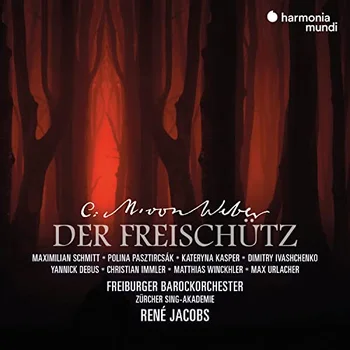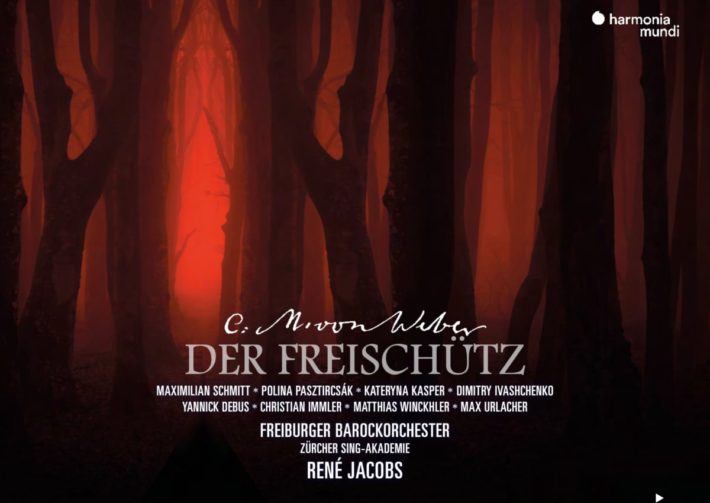After focusing on Beethoven with Fidelio (2019) and Missa Solemnis (2021), René Jacobs turns his attention to Carl Maria von Weber‘s Der Freischütz: the 3-act singspiel with a libretto by Freidrich Kind was heralded as a “milestone of German national opera” within days of its 1821 premiere. Today, it continues to be appreciated: we have, for instance, Sir Colin Davis’ 2012 LSO Live recording and two by Marek Janowski (the most recent in 2019). One should not forget the landmarks by Erich Kleiber & Cologne Radio Symphony (1955) and by his son Carlos some 20 years later with Staatskapelle Dresden.

A prime difference between Jacobs’ recording and the others mentioned above is his use of period instruments, but this doesn’t take away from the multidimensionality of orchestral sound we hear in places like the Overture. Where Kleiber Jr. (and Sr. for that matter), go for a more dramatic statement from the outset with intense crescendo swells, Jacobs takes a relatively subtler route – I was immediately struck by the horns’ seamless balance, rounded phrasing, and velvety tone. A dramatic effect lies in the character and color shifts we hear between the placid C major and the ensuing, more angst-driven minor counterpart, which even has a bit of Beethovinian flair.
Jacobs acknowledges some adjustments he’s had to make to account for text which Weber originally did not set to music. One example is the Hermit’s opening number, “Allerbarmen” (track 2) that is noticeably absent on other recordings. The inclusion is all for the betterment of the opera with a fine performance from bass Christian Immler. Immler has a mellifluous voice to begin with, but his expressiveness further captures both the hermit’s loneliness and a pointed anxiousness as he worries about Agathe.
Speaking of Agathe, soprano Polina Pasztircsák brings out her youthful innocence, even an angelic charm in her duet with the Hermit (Act 1, Scene 2). In her own arias such as Wie nahte mir der Schlummer (Act 2, Scene 2), her lovely voice comes front and center and is further supported by the delicate string accompaniment: her pitches and diction are clear as a bell, and her phrasing underscores a hopefulness that doesn’t sound overly-saccharine. The 2019 Janowski recording features Lise Davidsen in Agathe’s role. While Davidsen’s performance of this aria is equally convincing in its expressiveness, it could not be more different. The slower tempo lets her linger on each word a little more to evoke nostalgia. Her voice itself has a little more substance, and this richness becomes a suitable anchor and counterpart to the weight of the modern instruments.
Tenor Maximilian Schmitt’s portrayal of Max has a fervently heroic yet urgent edge as we hear in selections like his aria, “Ha! Furchtbar” (Act 2, Scene 7). A nice color shift at 0’30” in particular speaks perhaps to an interesting unveiling of the character’s vulnerability. The spoken verse by Kaspar, despite being short, also plays to the contrast between the two men – Kaspar sounds self-assured on the surface, but his side-remark to Samiel carries a cold and sinister edge.
Throughout the entire opera, the orchestra plays an active role in not only supporting the singers but also bringing and maintaining a high level of energy over a more than 2-hour span. What really stood out was Jacobs’ sensible pacing throughout, allowing the listener to savor each aria – something that Carlos Kleiber’s account is often missing with its rather breakneck speed.
The plentiful liner notes are divided into two parts: the first, by Martin Bail, shed light upon aspects ranging from the opera’s inspirations to the way the opera itself inspired and attracted audiences. Jacobs’ equally insightful musical analyses that follow offer a glimpse into the complex layers of Kind’s libretto as well as the rationale behind his own interpretative choices. With so many characters involved, the listener will certainly appreciate the “Who’s who in Der Freischütz” addendum along with the full sung texts and translations. The sound engineers do a fine job of capturing the orchestra’s small nuances and intricately moving parts, as well as each singer’s defining traits that bring their respective characters to life.
A top-notch performance from all, along with Jacobs’ fine artistic perspective makes this a must-listen and an essential addition to any listener’s shelf.
Recommended Comparisons:
C. Kleiber | E. Kleiber | Keilberth | Jochum
Weber – Der Freischütz
Polina Pasztircsák – Agathe
Kateryna Kasper – Ännchen
Maximilian Schmitt – Max
Yannick Debus – Ottokar
Dimitry Ivashchenko – Kaspar
Christian Immler – Eremit
Zürcher Singakademie
Freiburger Barockorchester
René Jacobs – Conductor
Harmonia Mundi, CD HMM90270001



















